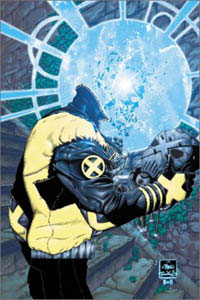
Up 'til about the halfway mark, I was enjoying it simply as a much-better-than-average superhero book, but I knew that I still hadn't cracked the underlying lesson, the secret parable, what Morrison has referred to as the "inoculation of ideas" that he is trying to deliver in his comics work. So I went back to the beginning of the mammoth volume and started skipping through the pages, reading random word bubbles here and there, until it finally hit me. This book, like mutation itself, is about evolution. Not just the aforementioned 'second evolution' that changes the appearance of the Beast from a pointy-haired monster into a more feline Beauty & the Beast creature, but the evolution of the X-Men comics themselves -- and superhero comics in general.
If the way I read it was correct, Morrison appears to have devoted his entire 42 issue run on the series to questioning its relevancy, trying to put an end to the artistically repetitive rut it had fallen into, and steering it in a completely new and previously unimagined direction. (This comic book crusade must have seemed all the more gutsy and blasphemous at the time, as the X-Men comics were still the best selling comic books in America week to week!) To spur on the book's own evolution, Morrison re-introduced many of the series' more tired and/or far-fetched tropes (Professor X's intergalactic love affair, Magneto's grandiose plans to rid the Earth of humans, Wolverine's endless quest to find out his past), bringing them to their logical conclusions and thereby creating a clean slate for future writers of the series. He also took many of the one-dimensional characters and, by adding a bit of a dichotomy to their personalities, made them much more complex -- again, giving future writers any number of new themes that they might tackle should they so desire. For example, by having the Cyclops character begin to question his role as leader of the X-Men and his love for Jean Grey, Morrison has created a new cipher for thoughts on personal, romantic and group responsibility. By tossing former nemesis Emma Frost into the X-Men, issues of trust and questions as to a person's ability to truly change can now be more readily played around with. The most direct calls for the comic's continued evolution, though, come in the way that Morrison writes Wolverine's origin, the rise of the U-Men, the '150 years in the future' flashforward, and Xavier's admission that humankind will never feel safe around mutants so long as mutants insist on fighting endlessly with one another. These are used not just as plot points, but also as a subtle 'ahem' to the publishers of the series, its future writers and its current readers. Morrison seems to be saying that if you want your X-Men comics to be about more than just guys in funny costumes with funny names fighting needless battles with one another, you've gotta change your scope of expectations, expand the ideas that you allow into the stories, and update the metaphors at least as often as the costumes. In short, evolve.
evolution, though, come in the way that Morrison writes Wolverine's origin, the rise of the U-Men, the '150 years in the future' flashforward, and Xavier's admission that humankind will never feel safe around mutants so long as mutants insist on fighting endlessly with one another. These are used not just as plot points, but also as a subtle 'ahem' to the publishers of the series, its future writers and its current readers. Morrison seems to be saying that if you want your X-Men comics to be about more than just guys in funny costumes with funny names fighting needless battles with one another, you've gotta change your scope of expectations, expand the ideas that you allow into the stories, and update the metaphors at least as often as the costumes. In short, evolve.
(I plan to reread the New X-Men omnibus in a month or so. If anyone has tips as to ideas, themes, etc. that I might want to look out for on my second go-round, please drop me a note in the comments section.)
Update: The Gardner Linn Fanclub has a thorough and amazing analysis of the series. It's well worth neglecting a little more of your 'real' work to take the time to read.
For a nice, long interview with Grant Morrison, click here. You'll be re-routed to Popthought.com.
Friday, May 25, 2007
Book Review: Grant Morrison's New X-Men Omnibus
Posted by
Inkwell Bookstore
at
12:08 AM
![]()
Labels: book reviews, comic book news



